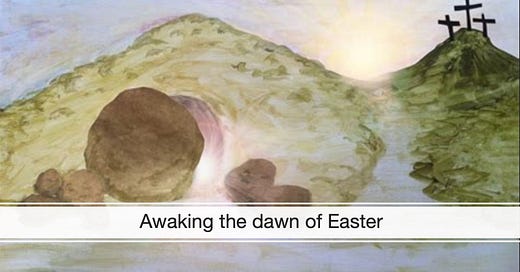Psalm 57:8-9, 10 and 12
There is a very famous statement in Psalm 30: “Weeping may tarry for the night, but joy comes with the morning” (Ps 30:6). The Passion of our Lord Jesus Christ ends on Good Friday in the evening. The body of Jesus is laid in the tomb and we can imagine the grief of Jesus’ mother and all his disciples. There is no account of Holy Saturday in the Gospels and so one gets the impression that the night that fell on Good Friday lasted to the dawn of Easter Sunday. The encounter with the risen Christ at the dawn of the day brought exuberant joy to all of Jesus’ followers.
The superscription of psalm 57 is interesting. It should be sung to a tune called “Do not destroy” and it is connected with David escaping from Saul into a cave (see 1 Sam chapters 22, 24 and 26). The Fathers of the Church saw in this psalm the prophecy of Jesus’ death and resurrection. Jesus’ body was placed in a grave that resembled a cave. But death could not destroy his body. Instead, death was destroyed by Jesus’ death and the resurrection of Jesus sheds light on the mystery of life. The risen Christ awoke the dawn of everlasting life. We can see in him our future, what God has prepared for those who love Him.
The victory of Christ over death also confirms God’s character described by the psalmist with two nouns: steadfast love or mercy (hesed in Hebrew) and faithfulness (emet in Hebrew). In verse 4 of this psalm, the psalmist asks the Lord to send his help from heaven and then he specifies his request by asking the Lord to send his steadfast love and faithfulness. The psalmist was confident that these two “messengers“ of God could save him (see Ps 57:4). And he was not disappointed. In verse 11, he describes God’s steadfast love as towering to the heavens and God’s faithfulness as reaching the sky (Ps 57:11).
Jesus Christ embodied these two characteristics of God in his life. “No one has greater love than this, to lay down one's life for one's friends” (John 15:13). “But God demonstrates his own love for us in this: While we were still sinners, Christ died for us” (Rom 5:8). “But after I am risen, I will go before you into Galilee” (Mark 14:24). “You seek Jesus of Nazareth, who was crucified. He has risen; he is not here. See the place where they laid him. But go, tell his disciples and Peter that he is going before you to Galilee. There you will see him, just as he told you” (Mark 16:6-8).
There is evil in this world that opposes God and those who trust in Him. But every crisis finds its resolution in Jesus’ resurrection at the dawn of the first day of the week (see Matt 28:1). The last word in the mystery of life does not belong to evil, crisis, tragedy, and even death. The last word belongs to the risen Christ, the Eternal Word of the Father, who is the resurrection and the life. This is our faith and hope. And so with the psalmist, we praise the Lord among the nations by proclaiming the Gospel of Life.




